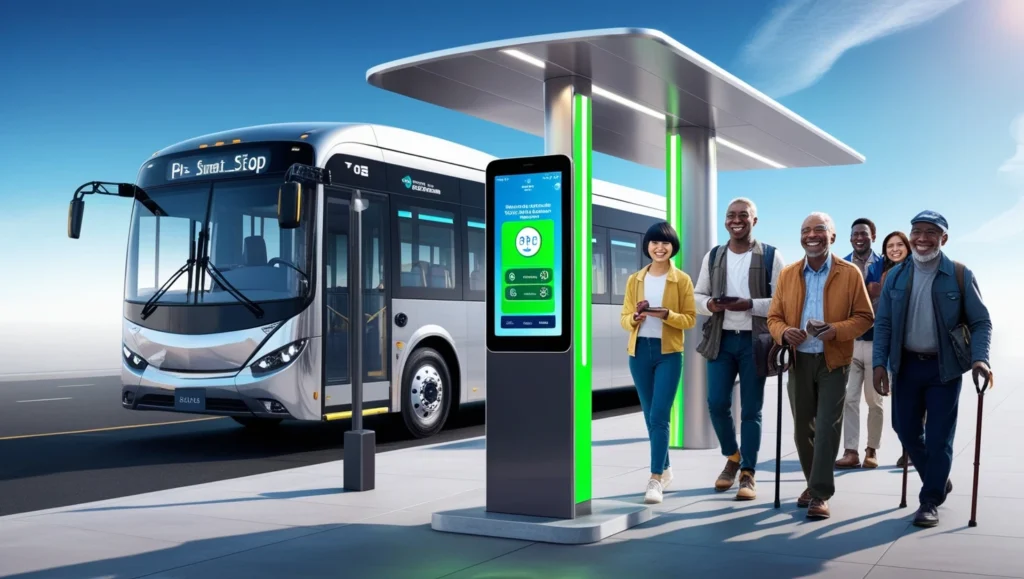How a Smart Bus Ticketing System Saves
Time and Money
Transportation that works well and doesn’t cost too much is more important than ever in today’s busy world. It has become clear that a Smart Bus Ticketing system is the best way to make travel easier for both passengers and bus operators. These devices are very convenient, save money, and work well because they use modern technology. We’ll look at the different ways that a smart bus booking system can help you save time and money.
What is a Smart Bus Ticketing System?
You can get rid of paper tickets on buses by using a smart bus ticketing system, which combines new technologies like mobile apps, contactless payments, and automated fare gathering. These systems use state-of-the-art tools to make buying tickets, validating them, and managing them easy.
Key Features of Smart Bus Ticketing Systems
1. Contactless Payments
Contactless payment technology is one of the best things about a smart bus ticket system. People don’t have to carry around cash because they can pay with their phones, smart cards, or other digital wallets. This function cuts down on delays and speeds up the boarding process.
2. Mobile Ticketing
With mobile ticketing, people can buy tickets and keep them on their phones. With NFC or QR codes, travelers can confirm their tickets right away, so they don’t have to carry around paper tickets or wait in long lines.
3. Real-Time Data and Analytics
Operators can learn a lot about passenger trends, peak travel times, and income from smart ticketing systems. This information helps people make better decisions and find the best routes.
4. Integration with GPS and Route Tracking
A lot of smart systems work with GPS, so people can see where their buses are at all times. This feature not only saves time, but it also calms you down by giving you correct information about when to arrive and leave.
5. Eco-Friendly Solution
Smart bus ticketing systems help protect the earth by getting rid of the need for paper tickets. They cut down on trash and encourage a greener, more environmentally friendly way to get around.
How Smart Bus Ticketing Systems Save Time
1. Faster Boarding Processes
When using old-fashioned ways to buy tickets, there are often long lines, especially during busy times. Contactless and mobile ticketing choices cut down on wait times for boarding, which helps buses stay on schedule.
2. Real-Time Updates
Mobile apps or SMS alerts can give passengers real-time information about bus routes and delays. This information helps them plan their trips better, so they don’t have to wait around for too long.
3. Automated Fare Collection
Automated methods for collecting fares make it easier to pay, which cuts down on mistakes and makes sure that the right fare is charged. This level of efficiency is good for both travelers and operators.
4. Reduced Administrative Burden
Operators no longer have to add up cash or paper tickets by hand. Transactions and reports are handled by automated systems, which frees up staff time to focus on improving service.
The Role of Technology in Smart Bus Ticketing
Putting artificial intelligence (AI) and machine learning (ML) together makes smart ticket systems more useful. AI-powered algorithms can guess how many passengers will be traveling, find the best ways, and make better use of resources. At the same time, ML models look at old data to find strange patterns, which makes sure that processes are safe and correct.
Some systems also use blockchain technology to make sure that deals are safe and clear. Fraud is less likely to happen with blockchain, and people can use it to safely send and receive money.
Conclusion
Smart bus payment systems are what public transportation will look like in the future. These methods are good for both passengers and operators because they save time, cut costs, and make travel better overall. Smart ticketing solutions will only get better as technology keeps getting better. They will be easier to use, more available, and more efficient.

